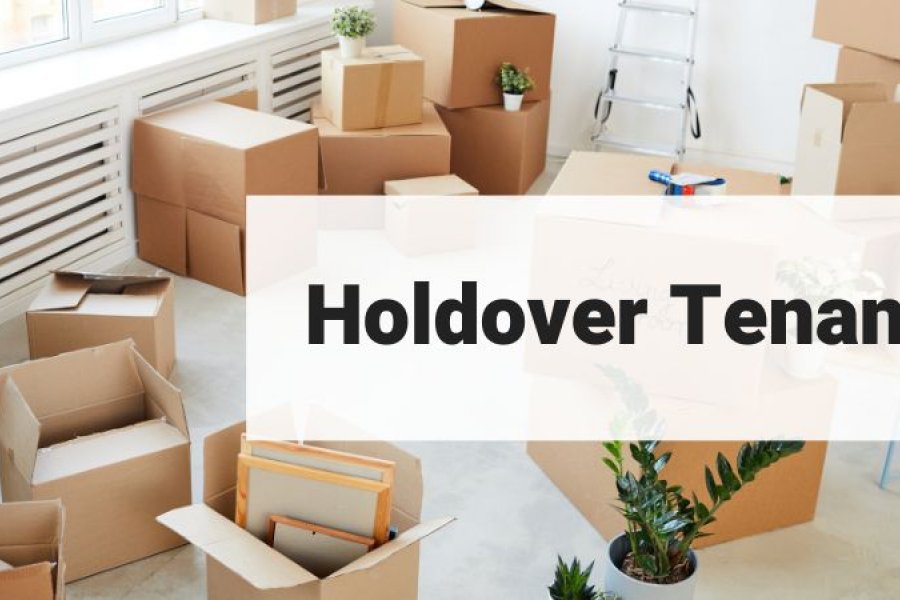
Do you know how to handle a holdover tenant? During your time as a landlord, you may experience a situation where a tenant doesn’t move out at the end of their lease, and knowing how to address the situation is vital.
In this article, property owners will learn how to lower the risk of having a holdover tenant, and what to do if a tenant refuses to leave at the end of their tenancy.
What Is a Holdover Tenant?
This is a tenant who stays on your property even after the term of the lease has come to an end. Although the lease has expired, they can continue to occupy the space legally provided that the landlord accepts rent from them.
The Risk of Having Holdover Tenants
You should be aware of the possible liabilities and damages you could face if your property still has a holdover renter. The tenant is no longer responsible for any damage done to the property if you aren't collecting payments from them. This places the responsibility for any damage to the rental before the holdover renter vacates or is evicted on you.
Another risk concern with holdover tenants is bringing in pets against the homeowner's will. Pets might end up hurting someone in addition to potentially causing significant damage to your unit. You might be held accountable if that happens on your property.

What Factors Cause a Tenant Holdover?
Depending on a state’s regulations, the expiring lease agreement’s terms might convert to a month-to-month arrangement. That said, this doesn’t entitle you to the same safeguards for your property.
Most landlords would rather have a new lease signed whenever it’s possible, but some tenants prefer the holding period because it allows them to keep living at the property without making a long-term commitment. Even if the situation is comparable to one where you rent on a month-to-month basis, it's preferable to always have a newly signed lease in place.
There are a number of reasons why an owner can have a holdover tenant. They could include the following:
- A tenant's reluctance to vacate the property for any reason
- The landlord has chosen not to renew the lease
- A new lease can be necessary as a result of a change in ownership, which could temporarily result in a holdover renter
To prevent this situation from occuring, it's best to send a move-out letter to tenants, before the end of their tenancy. This will also help provide documentation that you want them to vacate the unit by a given date.
What Alternatives Do Landlords Have for Holdover Tenants?
There are several options available to you if you have a holdover tenant in one of your properties. They are as follows:
Allow the Tenant to Stay
As a property owner, you can let a holdover tenant stay on your property, but you need to know how to handle it. The most crucial step is to quickly agree to sign a detailed lease with them. If you have already received payment, the tenant may occupy the property legally.

Depending on the state, this may also have an impact on the lease terms. Some states might convert it to month-to-month lease terms automatically.
Overstaying their lease term is no longer a valid reason for eviction once you have received payment from your holdover renter. Only accept payment when you are certain you are okay with them being on the property.
Evict the Tenant
You can decide to evict your tenant if you don't want them to stay. Although this stage is a little difficult, so don't evict tenants on your own because they have rights that have already been covered. If you don't follow the correct protocol, the tenant may accuse you of harassing them.
The first step is to talk to the tenant and tell them about your choice. If you and the tenant are still unable to come to an arrangement, you should follow the legal eviction procedure. If the court rules in your favor, the renter will be asked to vacate by a specific date. You must inform the authorities if the tenant still refuses to vacate.
Terminate the Lease Agreement
Although the lease agreement or local laws may allow tenants to stay, you should formally terminate the lease if the tenant is past the end of the lease term. After getting notice, the renter will have a specific amount of time to leave the property. If they still refuse to leave after the lease has been properly canceled, you will need to file for an eviction.

What Are the Rights of Holdover Tenants?
Although you have a few alternatives for handling holdover tenants, you must remember that they continue to have some legal rights. You might carry out a wrongful eviction if these rights are violated during the eviction procedure.
Holdover renters have the right to a safe and livable home as well as the ability to report health or safety problems. This implies that you must continue to care for the property in your usual capacity. If not, they could claim that you haven't kept your property habitable which brings certain legal implications with it.
Additionally, they have a right to notice before you visit the property. Respect their rights by serving an eviction notice to them in the proper way. Even though it isn't considered necessary, it will support your case.
Bottom Line
It’s a really difficult task to deal with holdover tenants. However, clear written communication and a comprehensive lease agreement can prevent unwanted holdover tenancies. If the tenant doesn’t move out at the end of their tenancy you can either negotiate a new lease contract with them or move forward with the legal eviction process.
If you're a property owner and don't know how to deal with holdover tenants, we at State Property Management LLC. are here to help. At State Property Management LLC., we are well-versed in property law and regulations and can settle disputes between tenants and landlords. We also provide full-service property management solutions. Contact us today to learn more!